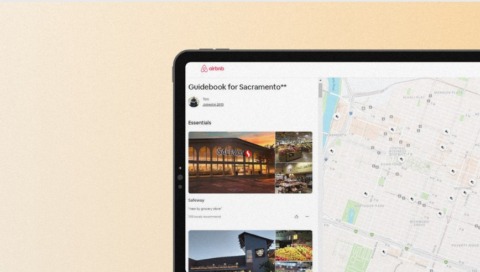Dipping your toes into the short-term rental industry can be daunting, especially with the looming fear of bad Airbnb guests potentially wreaking havoc on your property.
However, while these concerns are valid, it’s essential to understand that the likelihood of encountering such guests is minimal, especially when equipped with the right preventive measures.
The Reality of Bad Guests
The allure of short-term rentals has grown exponentially over the years, with many hosts reaping substantial financial rewards. However, like any business venture, it’s not without its challenges. One of the most discussed and feared aspects of hosting is the potential of encountering bad guests. But how prevalent are these bad guest experiences, and how can hosts equip themselves to handle such situations?
Understanding the Numbers
First and foremost, it’s crucial to put things into perspective. While horror stories of guests trashing properties or violating house rules might make headlines, they represent a tiny fraction of the overall guest experiences. Most guests are respectful, understanding, and simply looking for a comfortable place to stay.
Proactive Over Reactive
The key to minimizing bad guest experiences is adopting a proactive approach rather than a reactive one. By implementing thorough screening processes, setting clear house rules, and maintaining open communication lines with guests, hosts can significantly reduce the chances of negative incidents.
Building Trust
Building a sense of trust with guests starts from the moment they show interest in a property. By promptly answering queries, providing accurate property descriptions, and being transparent about house rules, hosts can foster a relationship built on mutual respect.
Screening Guests: 5 Red Flags

Being informed and vigilant can make all the difference in the world of short-term rentals.
Last-minute bookings
Immediate reservations can sometimes be a cause for concern. It’s essential to understand the reasons behind such hasty bookings.
If someone books a few hours before arriving at your property, then you have less time to communicate with them and check the reviews, so it’s more likely that you could get a bad guest. So one easy way you can prevent this is by shortening your booking window - don’t allow same day bookings.
Tim Hubbard
Local bookings
Why would someone from the same city book a short-term rental? It’s crucial to understand their reasons.
Sometimes it’s because they want to use your property for something they don’t want to use their own property for a.k.a. a party ;).
Lack of communication
Communication is vital. If a potential guest isn’t responsive, it might be a sign to reconsider.
Mismatched bookings
If the number of guests doesn’t match the space they’re renting, it’s worth a second look.
It doesn’t really add up right? One person doesn’t need a 6 bedroom home. So you’ll simply want to ask them "Hey, I noticed you only have one guest on your reservation. Can you please provide us the rest of the guest names?" If they don’t respond, then that’s definitely a red flag.
Tim Hubbard
Repeat problematic guests
Recognizing and avoiding guests who have been troublesome in the past is essential.
Proactive Measures for Hosts
There are several steps hosts can take to ensure a smooth rental experience.
Clear House Rules
Setting clear and concise house rules is paramount. This isn’t just about listing what guests can or cannot do; it’s about setting expectations.
Consider including guidelines on:
- Check-in and check-out times.
- Smoking or pet policies.
- Quiet hours, especially if the property is in a residential area.
- Usage of amenities such as a pool or gym.
- Any off-limit areas or items within the property.
A well-structured house rule section can prevent misunderstandings and ensure guests know what’s expected of them.
Get My Proven Airbnb
House Rules Template
After hosting over 30,000+ guests, these 12 proven House Rules will protect you from just about anything…
Leveraging Technology for Safety and Compliance
While privacy is crucial, having security cameras at entry points can deter potential mischief and provide hosts with peace of mind. Always disclose the presence of cameras to guests.
Noise monitoring devices are essential. Devices like NoiseAware or Minut can detect elevated noise levels, allowing hosts to address potential issues proactively without infringing on guests’ privacy.
Lastly, smart locks allow hosts to change access codes between bookings, ensuring previous guests can’t re-enter the property. They also enable hosts to monitor check-in and check-out times.
Guest Reviews – A Window to Past Behavior
Before accepting a booking, always check the reviews left by other hosts for potential guests. These reviews can offer insights into their behavior, respect for property rules, and overall compatibility with your listing. If you’re on VRBO, make sure to check past VRBO reviews.
Remember, it’s a two-way street. Leaving honest reviews for guests can help other hosts in the community make informed decisions.
Open Communication Channels
Always maintain open lines of communication with your guests. From the moment they book until they check out, ensure they feel comfortable reaching out with any questions or concerns. This not only builds trust but can also preemptively address potential issues.
The Bigger Picture

While stories of bad Airbnb guests might occasionally make the rounds on social media or in the news, it’s essential to keep things in perspective. The vast majority of guests are respectful, looking for a comfortable place to stay, and appreciate the effort hosts put into creating a welcoming environment.
According to a survey conducted by Airbnb in 2019, less than 1% of total stays result in a reported issue. This underscores the fact that most Airbnb experiences are positive for both hosts and guests.
Economic Impact
Short-term rentals have revolutionized the hospitality industry. They offer an additional income stream for hosts, boost local economies by driving tourism, and provide guests with unique, personalized experiences. In many cities, the influx of guests staying in Airbnb properties has led to increased business for local shops, restaurants, and attractions.
Continuous Learning
Every guest brings a new experience, a new story, and a new lesson. Whether it’s feedback about the amenities, suggestions for local activities, or insights into improving the guest experience, there’s always something to learn and improve upon.








